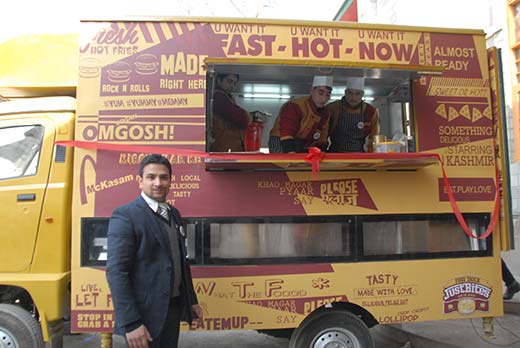A management student’s search for an authentic burger led to opening of Kashmir’s first street food chain. Safwat Zargar meets the budding entrepreneur who wants to reinvent traditional Kashmiri cuisine for on-the-go food junkies
 In 2012, when 26-year-old Shazan M Shah, a student of Management in Bangalore, was on a vacation back home, he wanted to taste “an authentic burger” to feed the “food-junkie” in him. While the search for an “authentic burger in Kashmir” didn’t yield any success then, two years down the line, Shazan is the owner of first ever mobile food kiosk service in Kashmir.
In 2012, when 26-year-old Shazan M Shah, a student of Management in Bangalore, was on a vacation back home, he wanted to taste “an authentic burger” to feed the “food-junkie” in him. While the search for an “authentic burger in Kashmir” didn’t yield any success then, two years down the line, Shazan is the owner of first ever mobile food kiosk service in Kashmir.
On Monday, Shazan flagged off his meals-on-wheels food outlet from the compound of Srinagar Municipal Corporation (SMC), adding a list of more than two dozen street-food delicacies to the menu of on-road eaters.
“Those were not burgers,” says Shazan, while recalling the experience of where it all began. “I wanted to introduce a concept of street-food with thrust on mobility and high-quality standards.”
In present scenario, people are on the go and want food that can be eaten while walking, Shazan explains. Aware of the time-constraints and the requirements of his target customers, he has consciously named his firm as ‘Just Bites.’
‘Just Bites’ serves everything from hot Kathi rolls to burgers and crunchy Tabakhmaaz. According to the young entrepreneur, he has devised his Rs 15-138 ranged menu in order to be “affordable” to most of his target customers – office goers and students. During the initial days, the food truck is likely to be seen near Kashmir University, J&K Bank Corporate Headquarters and outside tuition centres in Baghat and Parray Pora.
Shazan’s story is atypical of a youth seeking better education outside the state. The passing of admission session in 2007 due to a backlog in Chemistry in his 12thstandard had compelled Shazan to leave Kashmir and get admission in a management school in Bangalore. Till then, he had “all plans to have his full studies in Kashmir.”
After finishing his Masters in Business Administration (MBA), Shazan joined a magazine in Bangalore where he handled social media and sales. But the foodholic nature in him didn’t let him to get in the swing of the things at the media house.
“It was very hard to convince my parents as both of them were government employees,” he says. “This government job mentality in Kashmir was very hard to put at rest. Being a first generation entrepreneur is not easy and I had no experience.”
To understand the food industry, Shazan took the help of Chefs at Work – an Indian consultancy for food. After spending some seven to eight months at the consultancy, Shazan says, he knew the industry “inside-out.” He credits the realization of his food idea to the CEO of Chefs at Work, Chef Rajneesh Gandhi. In January 2014, he submitted his business proposal to Jammu and Kashmir Entrepreneurship Development Institute (JKEDI).
It took him six months for the paper work and licence from SMC. In fact, Shazan claims to be the recipient of “first hawker’s licence” from SMC. He has also got a licence from Food Safety and Standards Authority of India (FSSAI). With a capital of 35 lakh rupees, ‘Just Bites’ operates from a central kitchen at Chanapora, whereas the single mini-truck fitted with grillers, heaters and deep freezers will roam places thronged by youth.
At present, Shazan’s unit employs seven – all Kashmiris. Shazan synthesizes his intention of generating local employment and promoting Kashmiri culture, with the experimentation of two exclusive Kashmiri foods – Roghan Josh rolls and Lotus Stem fries. Kehwa also finds a mention in his menu.
“Street food market in Kashmir depends upon the tourist influx,” says Shakeel Qalander, former president of Federation Chamber of Industries Kashmir FCIK and civil society member. ”Kashmir, which has unorganized street-food market, has an estimated market value of not more than a hundred crores. Kashmiris are known for their food habits and with this innovation a new trend will start picking up among the fast food lovers.”
At present, the city has several food streets offering a variety of multi-cuisine dishes to the foodies. However, barbecue market at Khayam and Boulevard top the charts of youth’s appetite.
In 2013, a report published by Crisil, a global analytical company providing ratings, research, and risk and policy advisory services, India’s fast-food segment was calculated to swell to 70 billion rupees in three years.
Qalander draws parallels of food truck initiative to the introduction of Tiffin systems in India. “Despite apprehensions of its failure during its infancy, the Tiffin system is a thriving business in Indian cities,” he says, adding, “one of the reasons for its success was the affordability.”
“It has to be economical in order to succeed,” he says. “Initiatives like these have huge employment potential.”
According to Professor Bashir Ahmad Dabla, at Department of Sociology, Kashmir University, the trend represents broader transformation of technological and global changes in attitudes and food habits towards the micro level segments. “Technology and subsequent unidirectional globalization actually results in this kind of innovations. It is a youth phenomenon and it is mostly for them,” he adds.
Meanwhile on the day of launch, three hours in the market at Baghat, Shazan’s truck went out of stock in rolls. Shazan’s chemistry with the fast food business is likely to pass this time, without any backlogs.















